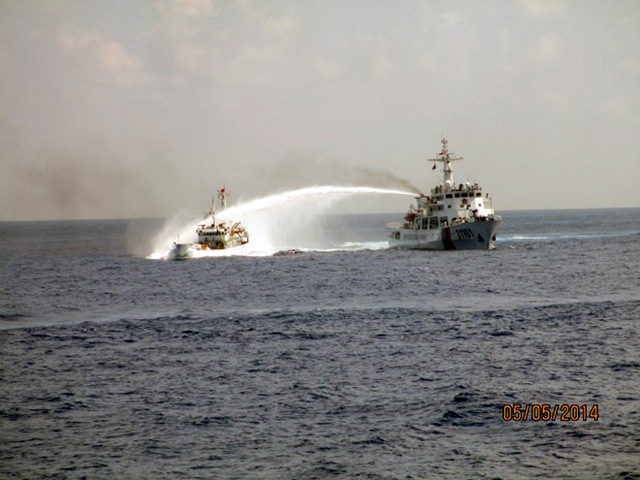"...its decision to seek the UN's support “suggested that Beijing is growing uneasy about the damage its reputation has suffered from the spat with Vietnam and from a similar dispute with the Philippines, both of which have characterized China as a bully pushing around its smaller neighbors,” the Wall Street Journal added."
China seeks int'l sympathy over South China Sea
It's a sign that criticism over South China Sea disputes, involving both the Philippines and Vietnam, 'is starting to hurt China'
 'CHINESE AGGRESSION.' A handout photo released by Vietnam's coast guard on May 7, 2014 shows a Chinese vessel (right) using water cannons on a Vietnamese vessel (left), near the Paracel Islands on May 5, 2014. File photo by Vietnam Coast Guard/EPA
'CHINESE AGGRESSION.' A handout photo released by Vietnam's coast guard on May 7, 2014 shows a Chinese vessel (right) using water cannons on a Vietnamese vessel (left), near the Paracel Islands on May 5, 2014. File photo by Vietnam Coast Guard/EPA
MANILA, Philippines – China claimed it wants to “set the record straight” on its dispute with Vietnam as it explained on Tuesday, June 10, its unusual move to seek the United Nations' support in the maritime row.
In a media briefing in Beijing, Chinese Foreign Ministry spokesperson Hua Chunying justified China's move to send a position paper against Vietnam to UN Secretary-General Ban Ki-moon.
“China has repeatedly lodged solemn representations with the Vietnamese side, requesting them to stop all forms of disruptions and withdraw all the vessels and personnel from the site," Hua said.
“However, instead of restraining itself, the Vietnamese side has gone even further by carrying out more disruptive and destructive activities at the site, spreading rumors around the world to vilify and hurt China unscrupulously and groundlessly and issuing notes that distort facts to international organizations including the UN,” she explained.
“Given that,” she added, “we must present the facts in front of the international community so as to set the record straight.”
The move reportedly showed that China is “growing uneasy” about its reputation, the Wall Street Journal observed, as South China Sea disputes with Vietnam and the Philippines have helped characterized China as a “bully.”
Criticism 'starting to hurt China'
China sent the position paper to the UN – which it even requested to circulate among UN members – even as it has consistently frowned upon a multilateral or third-party approach to South China Sea disputes.
Why did China do this, if it has, in fact, insisted on bilateral or one-on-one talks with the Southeast Asian countries involved? (READ: China's strategy vs PH: Trial by publicity)
On Tuesday, the Wall Street Journal offered an answer. It reported that China, on one hand, “maintained its resistance to seeking a multilateral resolution in the dispute.”
On the other hand, its decision to seek the UN's support “suggested that Beijing is growing uneasy about the damage its reputation has suffered from the spat with Vietnam and from a similar dispute with the Philippines, both of which have characterized China as a bully pushing around its smaller neighbors,” the Wall Street Journal added.
It described the move as “a sign that the criticism is starting to hurt China – which had worked hard to convince its Asian neighbors of its 'peaceful rise' before taking a more assertive approach to territorial issues in recent months.”
Even its neighbors in the Association of Southeast Asian Nations want to send a “strong signal” to China against its aggressive behavior, a Filipino diplomat told Kyodo News. (READ: PH weighs proposed ASEAN meet on South China Sea)
'Moral suasion' vs China
The Philippines partly banks on this fear by any country – to lose face – in pursuing a historic case against China over the South China Sea, which the rising superpower has rejected.
True, international courts have no police powers. But the Philippines' lawyer in its case against China, Paul Reichler, said China will pay a heavy price if it becomes an “international outlaw.”
Dr Lowell Bautista, a lecturer at the University of Wollongong in Australia, told Rappler that states generally comply with international law “to maintain their standing and reputation as good and law-abiding members of the international community or to avoid direct or indirect sanctions following an infraction or non-compliance.”
The Philippines said it is using its “moral suasion” against China. – Rappler.com

No comments:
Post a Comment